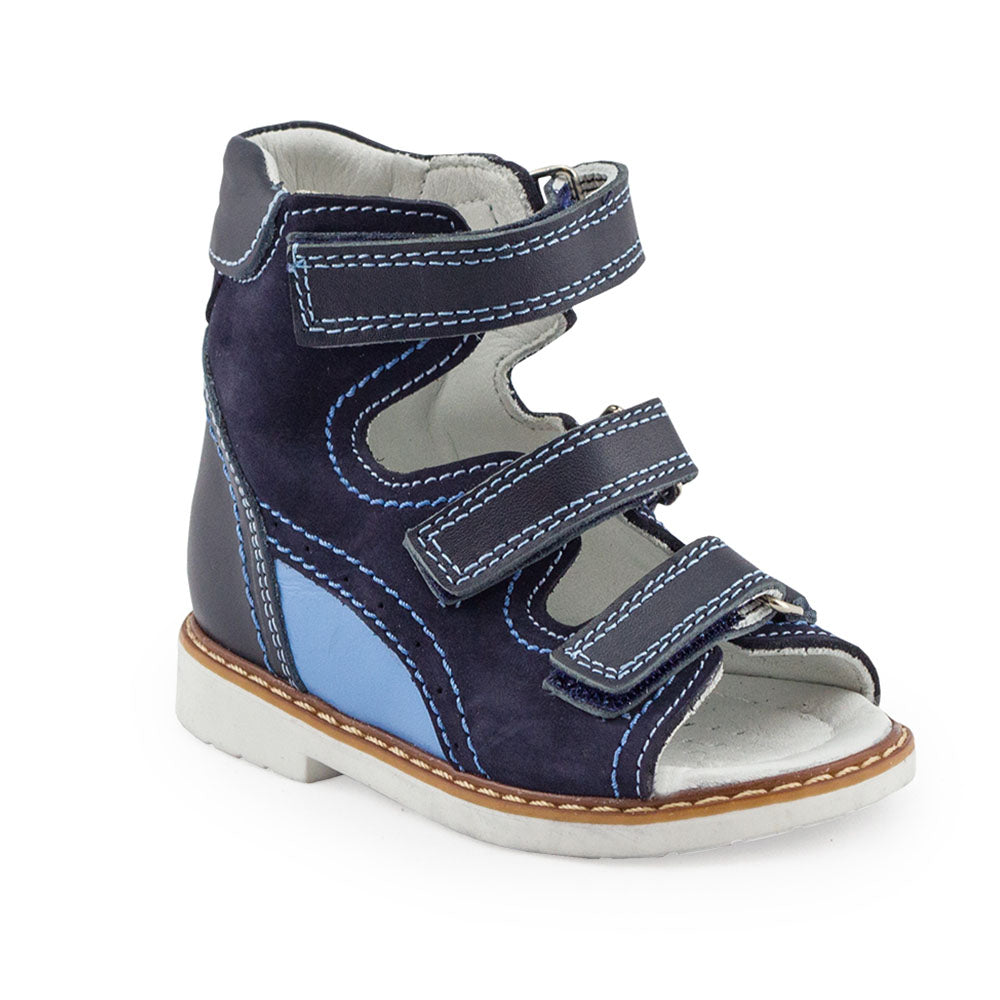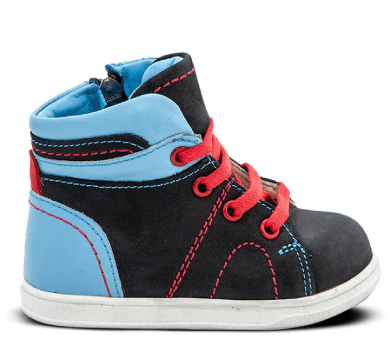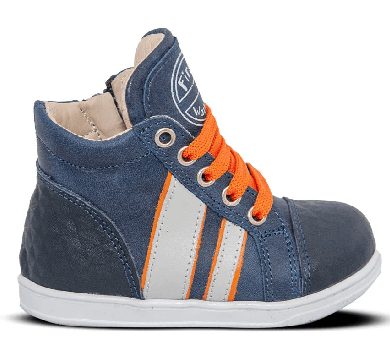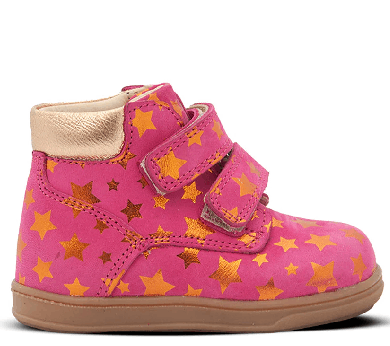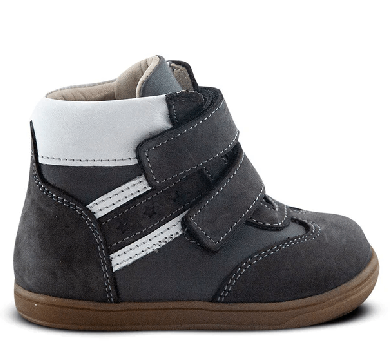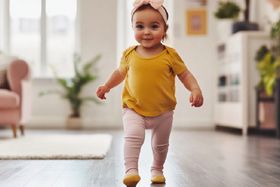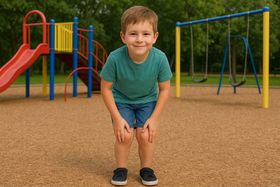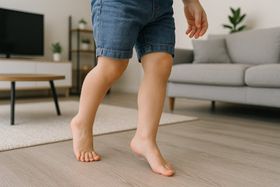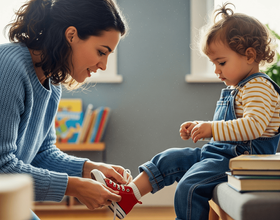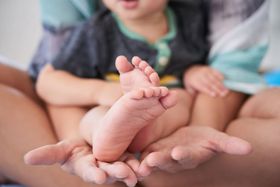Stinky Baby Feet: Common Causes and What to Do
Baby foot odor is usually caused by sweat, trapped moisture, and bacteria. Tight swaddles, synthetic socks, and rarely-cleaned toes make it worse, while breathable fabrics, daily foot care, and proper shoes (like First Walkers) help prevent it.
Published July 16, 2025
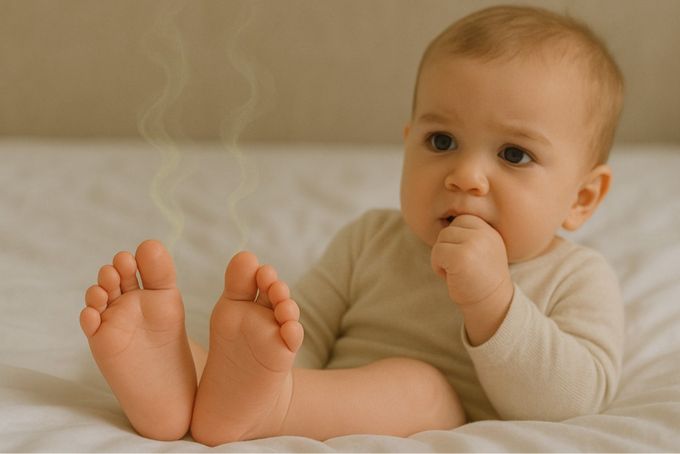
You take off your baby’s socks, expecting that sweet baby smell. Instead, you get a whiff of something sour. It’s unexpected. Maybe even a little concerning.
But baby foot odor causes are more common than most parents realize; usually, a mix of sweat, warmth, and enclosed shoes. And bacteria are what actually cause the smell.
The good news is this: it’s almost always harmless and easy to fix. In this article, I’ll explain what causes smelly baby feet, when you should be concerned, and what simple changes can help keep your little one's feet clean, dry, and odor-free.
» Keep your toddler's feet cool during summer with orthopedic sandals
When Do Babies’ Feet Start to Smell?
Most babies don’t develop noticeable foot odor until they begin sweating more frequently. But even a 2-month-old baby’s feet can smell if socks trap moisture or their skin is extra sensitive.
That moisture is a welcome mat for bacteria like Staphylococcus epidermidis, which feed on amino acids in the sweat and produce isovaleric acid, the real culprit behind that funky smell [1].
Smelling baby feet might seem odd, but for many parents, it’s a way to monitor hygiene or simply enjoy that unique baby scent, until it turns sour.
» Find out why your baby might be walking with a wide stance
4 Reasons Your Baby's Feet Stink
1. Weak Skin Barrier Plus Sweat Leads to Baby Foot Odor
A baby’s skin starts off with a neutral pH. Over the first days and weeks, it develops a mild acidity to help fight off harmful microbes. But this “acid mantle” is still forming in the first few months.
When baby feet are wrapped in socks or shoes for long periods, moisture builds, causing the microbes to thrive. These bacteria then feed on the sweat, causing your baby's feet to smell like cheese or vinegar.
The same goes for hydration. Newborn skin is adapting to life outside the womb. As it adjusts, it’s prone to sweating, and in warm, enclosed spaces like booties or sleepers, that sweat stays put.
» Explore the developmental milestones babies go through
2. Fever and Teething Raise Sweat, Which Causes Odor
When babies are teething or running a low-grade fever, their body temperature rises. That can lead to sweating, including from the feet. But while teething itself doesn’t cause odor, the sweat associated with it might.
In other words, a cranky, teething baby who’s been swaddled in warm layers all day might also have smelly feet. It’s not a coincidence, but it’s also not a cause for panic.
3. Heat, Swaddles, and Bad Socks Trap Sweat and Bacteria
The environment plays a big role in baby foot odor. Here’s what can make it worse:
- Over-Swaddling: If your baby is wrapped too tightly, she may overheat and sweat more. One study found that overly tight swaddling raises peripheral temperature, especially in warmer climates [2]. That heat gets trapped in the feet.
- Hot Weather: Bacteria love warmth and moisture. In warm, humid climates, foot sweat sticks around, and bacteria multiply.
- Synthetic Socks: Materials like polyester and nylon don’t breathe and can cause moisture buildup in baby shoes, encouraging odor. Unlike cotton or bamboo, they don’t allow air to flow or sweat to evaporate, making odor more likely.
» Are your toddler's knees bent inwards? It might be knock knees
4. Missed Cleanings and Damp Socks Feed Odor-Causing Germs
You wash your baby every day, but are her feet getting the attention they need?
- Skipping Between the Toes: Bacteria thrive in the moist skin folds between toes. That area is often missed in quick baths.
- Damp Socks: Putting socks on wet feet (even if just after a bath) traps moisture. So does forgetting to change sweaty socks on a warm day.
- Leaving Toenails Long: Under those tiny nails is a hidden home for dirt and bacteria. Keep them trimmed and clean to avoid buildup, especially if you notice that your toddler's foot odor lingers despite washing.
» Learn how kids develop their gross motor skills
Strong Baby Foot Odor Could Also Signal a Serious Condition
If your baby’s foot odor is strong, persistent, or comes with skin changes, it might be more than just sweat:
Fungal Infections (Athlete’s Foot)
Though rare in babies, athlete’s foot can occur, especially if they’ve had prolonged dampness or fungal infection signs like peeling or redness between toes.
Rare Metabolic Disorders
Conditions like Isovaleric Acidemia can make feet smell like sweaty cheese during illness. Another one, Trimethylaminuria, gives a fishy odor [3]. These are very rare and usually come with other symptoms, poor growth, developmental delays, or strong body odor in multiple places.
If you’re worried, speak with your pediatrician. A quick skin exam or blood test can rule out underlying conditions.
» Find out why your baby might be tip-toeing and how to address it
How to Prevent Smelly Baby Feet
You don’t need harsh chemicals or gimmicks to solve baby foot odor. A few smart changes usually fix it fast.
1. Choose Breathable Baby Shoes to Reduce Odor Risk
Plastic shoes and rigid soles trap heat and don’t allow airflow. That’s why First Walkers designs their baby shoes with breathable materials, antibacterial insoles, and flexible, shock-absorbing soles. They’re supportive without being stuffy, perfect for babies learning to walk.
2. Wash and Dry Feet Daily to Prevent Odor
- Wash feet with warm water and mild soap as part of a daily baby foot hygiene routine to prevent bacterial buildup. Pay attention to toes and under nails.
- Pat them completely dry after bathing; don’t rub.
- Use a soft baby cloth or fragrance-free wipe during the day if your baby is sweaty.
- Trim toenails regularly to keep bacteria from hiding underneath.
3. Let the Feet Breathe, Use Cotton, and Let Your Baby Go Barefoot
- Use socks made of breathable fabrics like cotton or bamboo. The best baby socks that can help prevent foot odor are soft, moisture-wicking, and not too tight.
- Avoid tight shoes. Let those little toes move freely.
- Let your little one be barefoot at home when safe; bare feet stay cooler and dry out faster.
- If you reuse baby shoes, give them time to air out fully between uses.
» Find out if kids learn to walk faster while barefoot
Most Baby Foot Odor Is Harmless and Easily Fixed
If you’ve ever wondered, “Why do my baby’s feet stink?” now you know: the answer lies in sweat, warmth, and bacteria, not poor hygiene or health concerns. Foot odor is common in babies, especially when moisture gets trapped by tight socks, synthetic shoes, or skipped cleanings.
In nearly every case, gentle care, breathable materials, and smart footwear choices are enough to resolve the issue. With the right daily habits, there’s no need to worry; just cleaner, fresher baby toes ahead.
And when it comes to shoes, First Walkers helps keep odor away by using breathable fabrics, antibacterial insoles, and flexible designs that let feet stay cool and dry.
References:
- “Microbial Origins of Body Odor | ASM.org,” ASM.org. Available: https://asm.org/articles/2021/december/microbial-origins-of-body-odor
- B. Tsogt, S. Manaseki-Holland, J. Pollock, P. S. Blair, and P. Fleming, “Thermoregulatory effects of swaddling in Mongolia: a randomised controlled study,” Archives of Disease in Childhood, vol. 101, no. 2, pp. 152–160, Oct. 2015, doi: 10.1136/archdischild-2014-307908. Available: https://pubmed.ncbi.nlm.nih.gov/26515228/
- S. C. Mitchell, A. Q. Zhang, T. Barrett, R. Ayesh, and R. L. Smith, “Studies on the discontinuous N-oxidation of trimethylamine among Jordanian, Ecuadorian and New Guinean populations,” Pharmacogenetics, vol. 7, no. 1, pp. 45–50, Feb. 1997, doi: 10.1097/00008571-199702000-00006. Available: https://pubmed.ncbi.nlm.nih.gov/9110361/
- S. C. Mitchell, A. Q. Zhang, T. Barrett, R. Ayesh, and R. L. Smith, “Studies on the discontinuous N-oxidation of trimethylamine among Jordanian, Ecuadorian and New Guinean populations,” Pharmacogenetics, vol. 7, no. 1, pp. 45–50, Feb. 1997, doi: 10.1097/00008571-199702000-00006. Available: https://pubmed.ncbi.nlm.nih.gov/9110361/
Disclaimer: First Walkers' information is intended for educational and informational purposes related to toddler footwear and feet. We encourage you to consider individual circumstances and consult qualified orthopedists about specific conditions.
FAQs
Do smelly feet mean my baby has a fast metabolism?
Not really. Active babies do tend to sweat more, but foot odor isn’t a reliable sign of energy level or metabolism. It’s mostly about moisture, warmth, and bacteria. Keep the feet clean and dry, and the smell usually goes away on its own.
What if one of my baby's feet smells worse than the other?
This is usually nothing to worry about. One foot may have deeper skin folds, tighter socks, or might’ve stayed swaddled longer. Small differences in sweat and airflow are normal. Unless there’s redness, cracking, or a rash, you can treat it the same way as general foot odor.
Can I put baby powder in my baby's socks?
It's not recommended. Baby powder can irritate your baby's lungs if inhaled. Instead, keep feet clean and dry, and choose breathable socks.
What foods cause baby's feet to stink?
Foods like garlic, onions, and spicy dishes can cause stronger body odors, including foot smell, as compounds exit through sweat.

